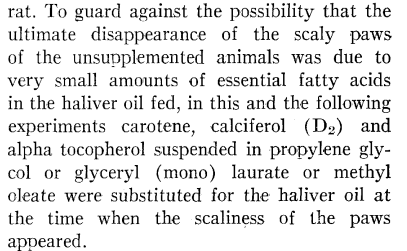The relation between vitamin B6 and the unsaturated fatty acid factor
-
This post is deleted! -
@peatolish i think he said it was like an insane small amount of PUFA that is important for the organism.
-
This post is deleted! -
@peatolish could be possible
-
This post is deleted! -
"All of the 9 animals which received no essential fatty acid showed development of scaly paws within 2 weeks after the initiation of the ad libitum feeding...

It should be noted that in the 9 animals which received no source of linoleic acid scaliness of the paws disappeared spontaneously, and within 66 days from the start of ad libitum feeding these animals, all of which had shown this symptom, were completely cured. The other skin lesions, when present, cleared much earlier.
This spontaneous disappearance of skin lesions within several weeks and paw scaliness within 66 days was again observed in a similar experiment carried out later with approximately the same number of animals on fat free ration A"

https://journals.sagepub.com/doi/abs/10.3181/00379727-66-16128
-
-
Didn’t Ray say your body will produce mead acid (omega-9) in the presence of a PUFA deficiency
-
Yes, he did.
"When dietary PUFA are not available, the body produces a small amount of unsaturated fatty acid (Mead acids), but these do not activate cell systems in the same way that plant-derived PUFAs do, and they are the precursors for an entirely different group of prostaglandins."